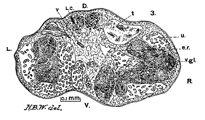Parasitology, Harold W. Manter Laboratory of

Studies from the University of Nebraska Zoological Laboratory
Date of this Version
1-1-1895
Abstract
When the early settlers made their homes along the shores of the Great Lakes, the waters of these inland seas teemed with fish. A cheap and apparently inexhaustible supply of food lay within easy reach, and they drew from it unstinted, nor was it strange that, with the increasing population and ever-widening means of communication, delicacies so tempting as the whitefish and lake trout were eagerly sought after in the markets of the neighboring cities, and that the ingenuity of generations of fishing folk was taxed to invent means of securing the fish-until finally, in the face of a growing demand and of improved apparatus for trapping the fish, natural methods of increase did not keep pace with the draft on the supply, and lake fish began to grow scarcer year by year. Artificial propagation had been tried in Europe, had proved a successful means of restocking depleted streams and ponds, and the newly founded fish boards of various states, charged in at least one case, Michigan, with the especial care of the whitefish, sought to perfect methods for hatching whitefish eggs. They were confident that therein lay the remedy for a great national calamity that seemed fast approaching-the loss of a food supply which, on the one hand, in its capture and distribution, gave employment to hundreds of men and vessels, and on the other furnished a cheap and agreeable supply of food to a large part of the central United States. But the methods which were so eminently successful in other instances have failed of final success in the Great Lakes. The annual catch of whitefish seems to be on the decline in spite of large sums spent by State and national fish commissions in hatching the fry and distributing them in the waters of the lakes. It has been a keen disappointment to all interested in fish culture that more immediate and pronounced results have not followed the extensive yearly plants of the fry; and some have attempted to explain the apparent failure on the ground that the present destructive methods of fishing effectually forbid any increase in the number of fish. They have, therefore, called for more stringent legislative regulations concerning methods of fishing, and for increased activity and artificial propagation. On the other hand it is evident that existing methods of fish culture may be open to criticism, and that the remedy as well as the fault must be sought here.


Comments
Published by Twelfth Report-State Fisheries.